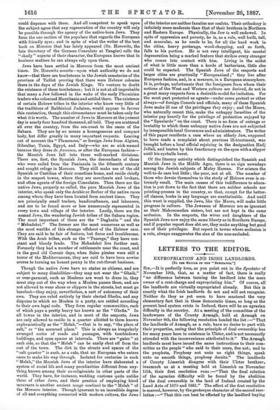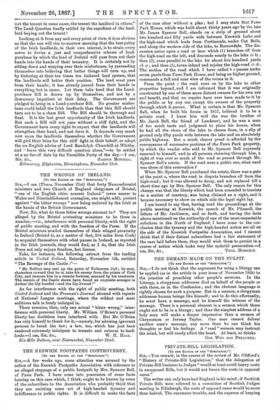LETTERS TO THE EDITOR.
EXPROPRIATION AND IRISH LANDLORDS.
rro Or TIM assor cos."I
Sin, —It is perfectly true, as you point out in the Spectator of November 19th, that, as a matter of fact, there is really "no difference between turning the landlord into the mere owner of a rent-charge and expropriating him." Of course, all the landlords are virtually expropriated already. But this is exactly what the Irish landlords do not and will not recognise. Neither do they as yet seem to have mastered the very elementary fact that in these democratic times, so long as the present land system exists in Ireland, there will be an agrarian difficulty in the country. At a meeting of the committee of the landowners of the County Armagh, held at .Armagh on November 8th, the following resolution headed the list :—" That the landlords of Armagh, as a rule, have no desire to part with their properties, seeing that the principle of dual ownership has for many years been in existence in Ulster, and is not necessarily attended with the inconvenience attributed to it." The Armagh landlords must have issued the same instructions to their com- mittee as the people "who said to their seers, See not ; and to the prophets, Prophesy not onto us right things, speak unto us smooth things, prophesy deceits." The landlords of County Limerick disagree with their Ulster brethrer. inasmuch as at a meeting held at Limerick on November 12th, their first resolution runs :—"That the final solution of the agrarian difficulty will be found by the abolition of the dual ownership in the land of Ireland created by the Land Acts of 1870 and 1881." The effect of the first resolution is marred, however, by the grotesque character of the second reso- lution :—" That this can best be effected by the landlord buying oat the tenant in some cases, the tenant the landlord in others." The Land Question finally settled by the expedient of the land- lord buying out the tenant !
Looking at it from any and every point of view, it is as obvious as that the sun will rise to-morrow morning that the best policy of the Irish landlords, in their own interest, is to strain every nerve to devise a just and comprehensive scheme of land- purchase by which the land of Ireland will pass from out their hands into the hands of their tenantry. It is certainly not by sitting down and weeping over their misfortunes, by persuading themselves into believing that better things will torn up, and by tinkering at their ten times ten tinkered land system, that the landlords will better their position. The land must pass from their bands; it has already passed from their hands in everything but in name. Let them take heed that the Land- purchase Bill is drawn up by themselves, and not by a democracy impatient at their delay. The Government are pledged to bring in a Land-purchase Bill. No greater misfor- tune could befall the Irish landlords than that this Bill should turn out to be a sham Bill. The Bill should be thorough and final. It is the last great opportunity of the Irish landlords. But such a Bill will not pass without a stiff fight, and the Government have every right to expect that the landlords will strengthen their hand, and not force it. It depends very much now upon the landlords themselves whether the Government will gird their loins for this stiff fight in their behalf, or adopt the un-English advice of Lord Randolph Churchill at Whitby, and " leave this very difficult question alone,"—to be settled at a no far-off date by the Parnellite Party of the day.—I am,











































 Previous page
Previous page